Digital Therapeutics for Mental Health - How Technology is Shaping the Future Well-Being
The field of digital mental health has expanded significantly in the last ten years, covering a wide range of areas such as digital therapeutics for mental health, personalized medicine, telehealth and telemedicine, and mobile health (mHealth). Digital therapeutics, which can frequently be prescribed or included in treatment plans, provide evidence-based interventions, in contrast to general wellness apps.
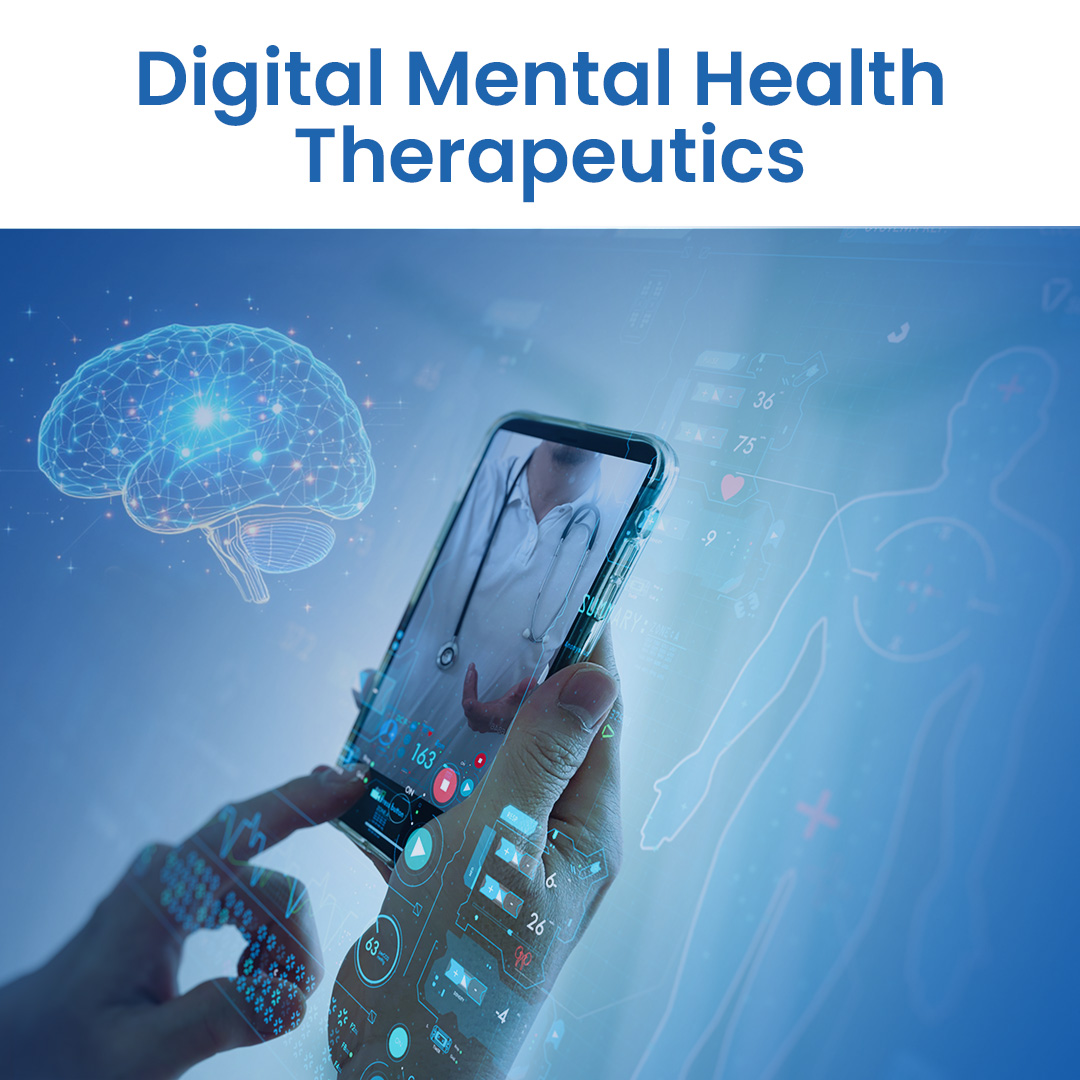
Transform Mental Health Access with Custom Digital Health Software Development Services Designed to Bridge Digital Care Gaps

“The impact potential here is significant, both in terms of clinical outcomes and economic benefits for stakeholders and societies. For example, research has shown that digital disease management can drive a 45 percent reduction in the three-month rate of major adverse cardiovascular events (MACEs) and a 50% reduction in the 30-day readmission rates for patients after acute myocardial infarction (AMI).”– McKinsey
What Are Digital Therapeutics: What CEOs Must Know
Digital therapeutics for mental health are clinically proven software programs used to treat, manage, and prevent mental health issues and other disorders. They provide validated and evidence-based therapies, which are a part of the larger category of digital health interventions, which also includes a wide range of apps about digital mental health. These are:
- Health software is designed to cure or lessen a medical condition, damage, or disease.
- Offer a medical treatment that has been shown to improve a patient’s health through scientific and clinical proof.
- Used alone or in combination with other therapies, technologies, or drugs.
- Prescription medication may or may not be necessary.
- The Food and Drug Administration regulates these items, which are commonly regarded as medical devices.
How is Technology Used for Mental Health Treatment?
New avenues for data collection and mental health care have been made possible by technology. Mobile devices provide new means of accessing assistance, tracking progress, and expanding knowledge about digital mental health for the public, medical professionals, and researchers.
Additionally, modern technologies can be bundled into complex mobile software. These apps may gather data about a user’s usual behavior patterns by utilizing the device’s built-in sensors. The app can then indicate that assistance is required before a crisis arises if it notices a behavior change.
Some applications are standalone software made to help with thinking or remembering. People can connect with peer counselors or medical practitioners through other apps.
A surge in development has resulted from excitement about the vast array of possibilities that technology presents for the treatment of mental health issues. Due to the lack of industry regulation and information regarding the efficacy of apps, users may be unsure of which ones to trust.
Check Our Case Study: AI Labeling & Safety Automation – Revolutionizing Regulatory Affairs, Compliance, Reducing Time, and Fueling Unstoppable Growth
Current Pain Points in Digital Therapeutics for Mental Health: What You Need to Know
Developing successful digital therapeutics (DTx) solutions requires negotiating a complex web of technological and medical issues. The primary challenges that we assist you in overcoming are as follows:
- Siloed Clinical Systems: The absence of digital therapeutic (DTx) connections with EHR platforms results in fragmented treatment. Clinician adoption is negatively impacted by a lack of smooth connectivity.
- Low Patient Engagement: Patient-facing DTx apps have poor adherence rates when they lack a solid behavioral design foundation, which significantly lessens the therapeutic effect. Check our case study to Improve the Quality of Care and Patient Experience
- Navigating Complex Regulations: Compliance issues, ranging from FDA approval to HIPAA, cause delays in launches. Numerous software initiatives for specialized digital therapeutics fall short of regulatory requirements, putting them at risk for an expensive redo.
- Delayed Time-to-Market: Organizations that create generics frequently lack experience in healthcare. The launch of verified, compliant DTx solutions has been delayed as a result of this.
Addressing the Holistic Unmet Need in Mental Health
Worldwide, there are currently up to 1 billion people who suffer from a chronic, complicated mental illness. An estimated 50% of people will suffer from a mental disease at some point in their lives, and 1 in 20 adults will suffer from a severe mental illness annually.
These statistics are accompanied by several well-documented mental health issues, such as stigma, limited access to care, a lack of psychiatric providers, and complicated health systems, all of which lead to chronic disease management and long-term support, delaying diagnosis.
Additionally, mental health treatments are imprecise, and some patients experience severe side effects, leading to inconsistent symptom control and uncertain results.
Prescription digital therapeutics, also known as PDTs, are a novel class of treatments that are particularly positioned to address some of these issues. They can provide an inventive solution for mental health illnesses because of the increasing use of technology in healthcare. Healthcare providers prescribe PDTs, which are installed on phones and use scientifically assessed evidence-based software to treat, manage, and prevent a wide range of illnesses and conditions.
Why the FDA Clearance is Significant
Even though the usage of digital therapeutics for mental health is growing, many businesses have failed to withstand the challenges presented by the American healthcare system. FDA approval, while by no means a panacea, has been crucial in assisting makers of digital therapeutics in navigating the industry’s complexity.
One reason digital therapeutics products don’t work is that to keep the media interesting, developers must improve or make new media, which necessitates new FDA approvals, which cost time, energy, and resources.
This problem might be resolved with the FDA’s approval, which would enable developers to incorporate an authorized mechanism into their media to transform it into a mental health treatment. The biofeedback mechanism functions as a “software kernel” that may be included in new or improved media because it already has FDA approval.
Supporting quicker FDA approvals and enabling access to mental health treatment in existing renowned media could increase the availability of mental healthcare. It is of paramount importance considering the American mental health crisis.
High-ROI Areas for CEO Investment: Where to Put the Funds for Scalable Impact
1. Digital Therapeutics (DTx) Platforms
CEOs can provide a useful means of helping staff members who are struggling with PTSD, anxiety, or depression by investing in digital therapeutics software development services. These clinically tested tools and solutions follow strict medical guidelines, ensuring safe, effective care while reducing long-term treatment costs and increasing access across teams.
2. AI Mental Health Assistants
Digital mental health assistants are quickly becoming essential for companies focused on well-being. They offer confidential, round-the-clock support at a much lower cost than traditional therapy. This results in keeping employees engaged and productive while cutting down on expensive healthcare claims. Check our case study: Affordable Health Plan, and Insurance Claims Processing
3. Virtual Reality Exposure Therapy (VRET)
Virtual reality therapy is changing how companies approach digital healthcare. By helping people overcome anxiety and phobias faster, sometimes 30-40% quicker, this technology reduces downtime and builds resilience.
4. B2B Preventive Care Ecosystem
Preventive care programs are proving to be smart business decisions. By promoting mental wellness early, these tools help cut healthcare costs by up to 25% and improve employee satisfaction. It often leads to better retention and a stronger company culture.
Build Accessible Mental Health Solutions That Overcome Digital Literacy Barriers and Reach Underserved Communities
How Leading Digital Therapeutics Are Redefining Scalable, Cost-Effective Mental Health Care: Key Takeaways
Digital therapeutics for mental health are transforming it by providing effective, evidence-based support through technology. Here are five keyways these solutions are changing how mental wellness is delivered, making it more affordable, accessible, and impactful for both individuals and organizations.
 1. AI-Driven Cognitive Behavioral Therapy (CBT) at Scale
1. AI-Driven Cognitive Behavioral Therapy (CBT) at Scale
AI-driven cognitive behavioral therapy brings high-quality digital health care to people faster than ever. By using advanced conversational technology, these tools provide real-time therapeutic support based on proven CBT methods.
Employees no longer need to wait for appointments or rely solely on in-person counseling.
This scalable model reduces stress, promotes early intervention, and offers a more consistent support system. For companies, it means better employee well-being with less disruption to work and fewer long-term healthcare claims.
2. Prescription Digital Therapeutics (PDTs) with Clinical Validation
Prescription digital therapeutics are raising the standard for mental health care by offering clinically validated treatments through engaging digital experiences. These tools are not just wellness apps; they are rigorously testing interventions with regulatory approval.
Designed to improve cognitive function and manage specific mental health conditions, they bring structured care plans into everyday life.
This approach makes mental health care more accessible, reduces reliance on medication, and provides measurable health improvements, offering organizations a reliable way to support their teams.
3. Automated Behavioral Programs for Anxiety & Insomnia
Fully automated digital programs are proving to be highly effective for addressing anxiety and sleep-related issues. These solutions use structured, evidence-backed methods to help individuals manage symptoms without the need for constant clinician involvement.
By promoting healthier sleep patterns and reducing anxiety, they improve overall well-being and work performance.
Organizations benefit from healthier, more focused employees while reducing costs associated with absenteeism and medication use. This approach is especially useful for supporting mental health across large, distributed workforces.
4. Mainstreaming Mental Health Support
One of the most impactful changes in mental or digital health care is the shift toward user-friendly, everyday tools. From simple chat-based interactions to interactive activities, these solutions encourage people to engage with mental wellness regularly.
This daily integration helps normalize conversations about digital mental health, reducing stigma in the workplace.
Companies adopting these tools often see stronger engagement, healthier workplace culture, and improved employee satisfaction. It creates a long-term positive cycle for both personal well-being and organizational performance.
5. Evidence-Backed Outcomes with FDA Clearance
Digital therapeutics for mental health with regulatory clearance offer a high level of trust and reliability. These solutions undergo rigorous clinical trials to ensure safety and effectiveness before reaching users.
For employers, this means investing in tools that deliver measurable outcomes rather than speculative wellness claims. Employees receive structured, proven care that supports their mental well-being in a regulated environment.
The combination of clinical credibility and ease of use makes these therapeutics a smart investment for scalable, high-impact mental health support.
Accelerate Market Entry with Customized Artificial Intelligence-Based Clinical Decision Support System That Navigate Complex Regulatory Landscapes
Future Outlook: Where CEOs Should Place Their Bets
The next wave of digital mental health innovation offers CEOs strategic investment opportunities. From AI companions to global expansion, these emerging areas promise scalable impact, lower costs, and better mental health outcomes across diverse industries and populations.
1. AI Coaches & Digital Companions
Virtual coaches and AI companions are gaining traction for delivering evidence-based cognitive behavioral therapy and stress management support. These tools offer instant, personalized guidance, helping users manage mental health more proactively. CEOs investing here can reduce workforce stress and improve employee engagement on a large scale.
2. VR Therapeutics
Virtual reality therapies are showing strong promise in treating anxiety, PTSD, and phobias. By creating immersive, controlled environments for exposure therapy, these solutions accelerate recovery. Forward-looking CEOs can tap into this high-growth niche to drive innovation in mental health support across diverse populations.
3. Hybrid Care Models
Combining in-person therapy with digital tools is emerging as a sustainable care model. It enhances flexibility, reduces wait times, and expands access to quality mental health services. CEOs can lead this transformation by integrating hybrid systems that balance personalization with scalability and cost-efficiency.
4. Global Expansion Potential
Digital mental health solutions are well-positioned to address care gaps in underserved regions. With scalable delivery and minimal infrastructure needs, they can support global well-being efforts. CEOs investing in these platforms can unlock new markets while advancing social impact on a global scale.
What Makes Digital Therapeutics for Mental Health from NextGen Invent Special?
In summary, NextGen Invent’s digital therapeutics for mental health combine clinical rigor with advanced technology, offering personalized, guided care that integrates smoothly into existing healthcare systems, empowering better outcomes for patients and providers alike.
- Integrated Digital Care: Our digital therapeutics software services integrate seamlessly with healthcare systems, allowing psychiatrists and therapists to extend patient care digitally. This approach ensures continuity, expands access, and improves patient engagement within established medical care pathways.
- Personalized Modular Therapy: We offer adaptable therapy modules, automatically personalized based on patient conditions. Clinicians retain control to modify treatments, ensuring flexibility, greater patient satisfaction, and better adherence through tailored digital mental health care.
- Optimal Guided Digital Care: We deliver guided digital care combining diagnostics, therapy planning, and real-time clinician interaction. This ensures higher treatment success and adherence, especially for complex cases, following modern evidence-based treatment standards.
At NextGen Invent, we build digital health solutions that drive real-world results, boosting care access, personalization, and clinician efficiency. Our digital health software development services can help you create scalable, evidence-based mental health platforms that deliver both clinical and business value.
Frequently Asked Questions About Digital Therapeutics for Mental Health
Related Blogs
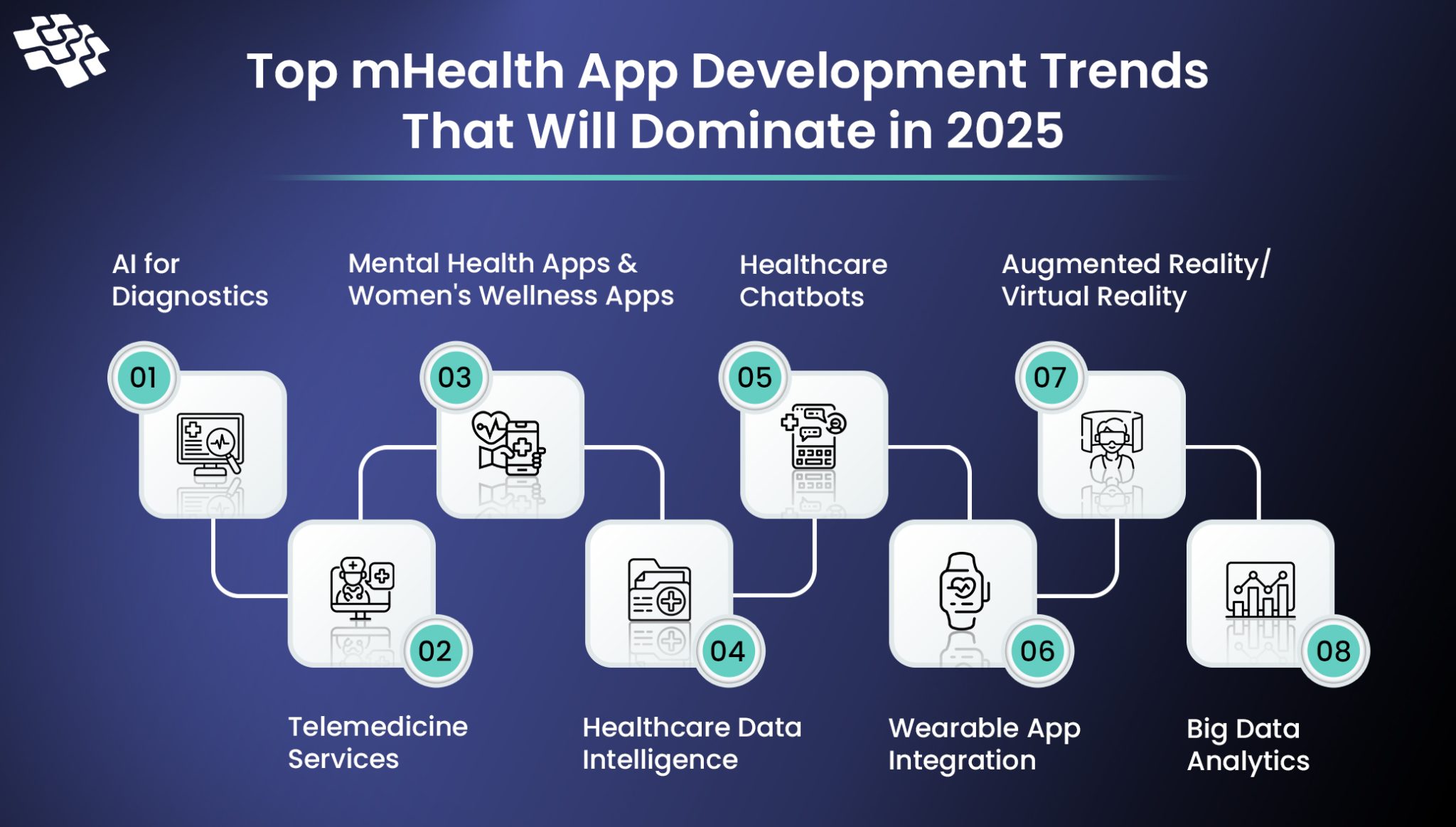
Top mHealth App Development Trends That Will Dominate in 2025
The need for custom AI mHealth app development has never been higher, as seen by the roughly 5 billion mobile users worldwide and the more than 36,260 healthcare and medical apps available on the Google Play Store.
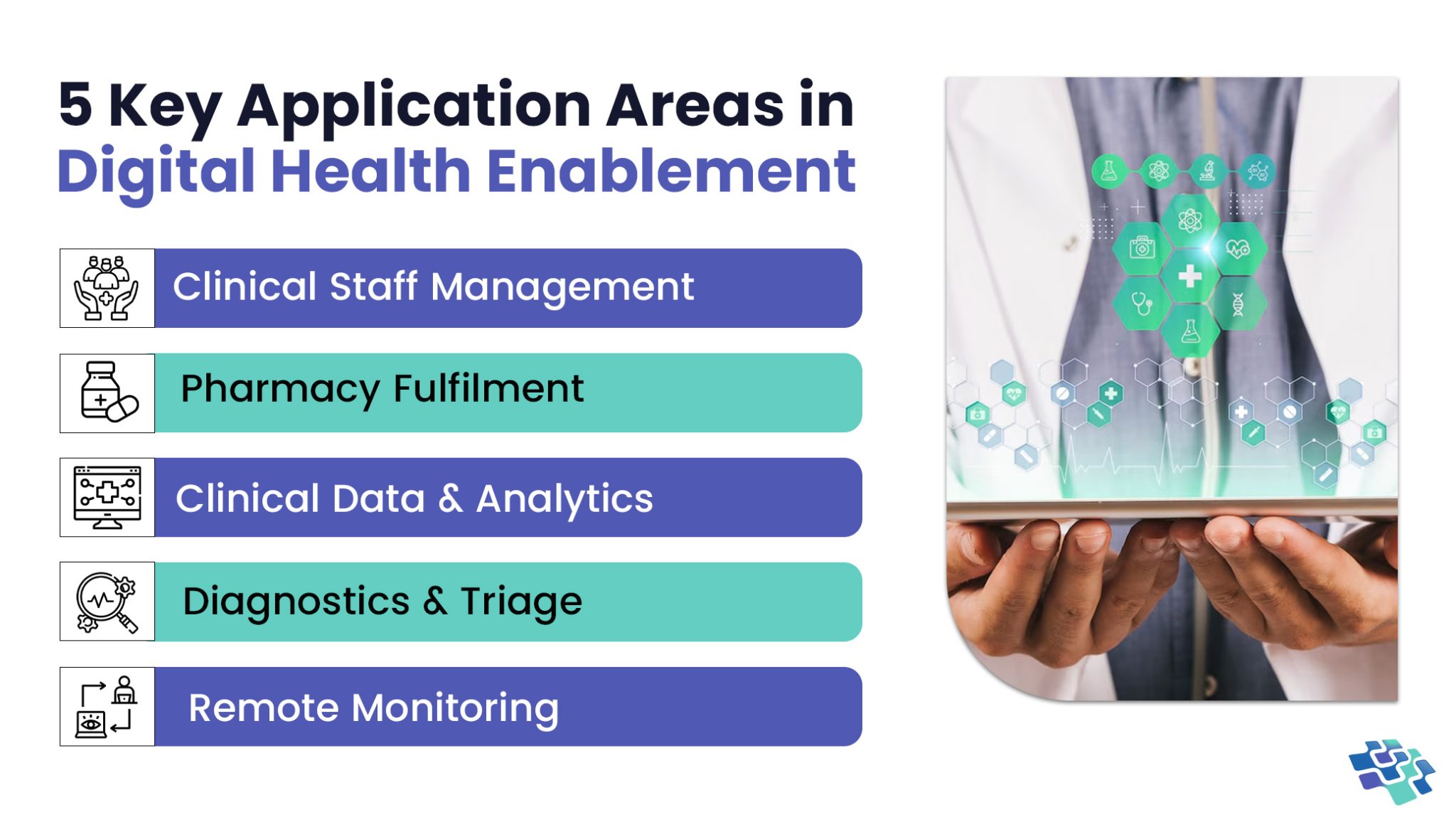
Unlocking Healthcare Innovation through Digital Health Enablement
A few minutes of delay in accessing data could mean the difference between life and death in healthcare delivery organizations where every second matters. About 30% of the world’s data volume is produced by the industry.
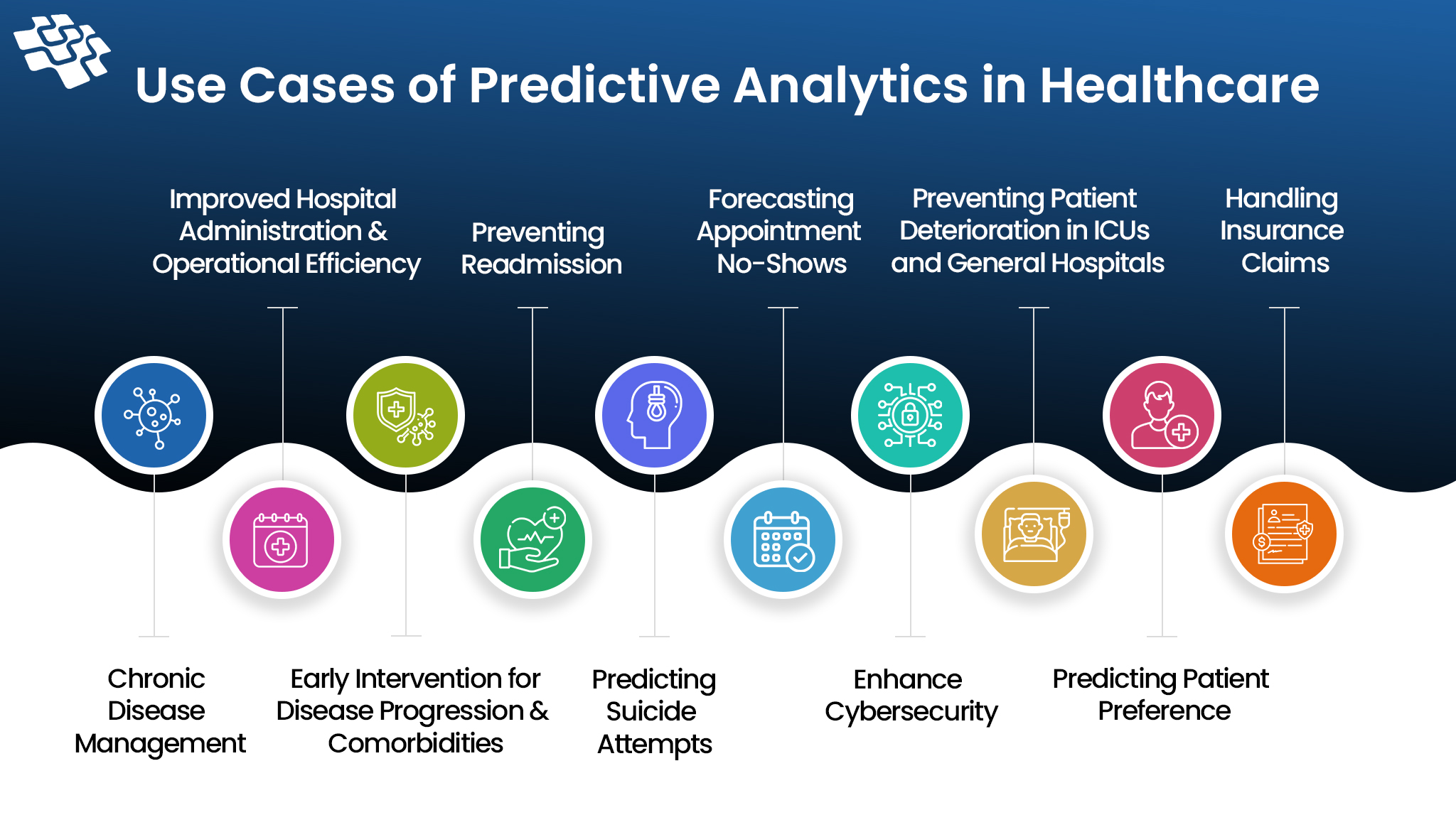
How is Predictive Analytics in Healthcare Revolutionizing It?
Predictive analytics in healthcare is real and not just science fiction. Better patient care and early intervention are made possible by predictive analytics, which forecast health outcomes using advanced analytics tools and healthcare data.
Stay In the Know
Get Latest updates and industry insights every month.
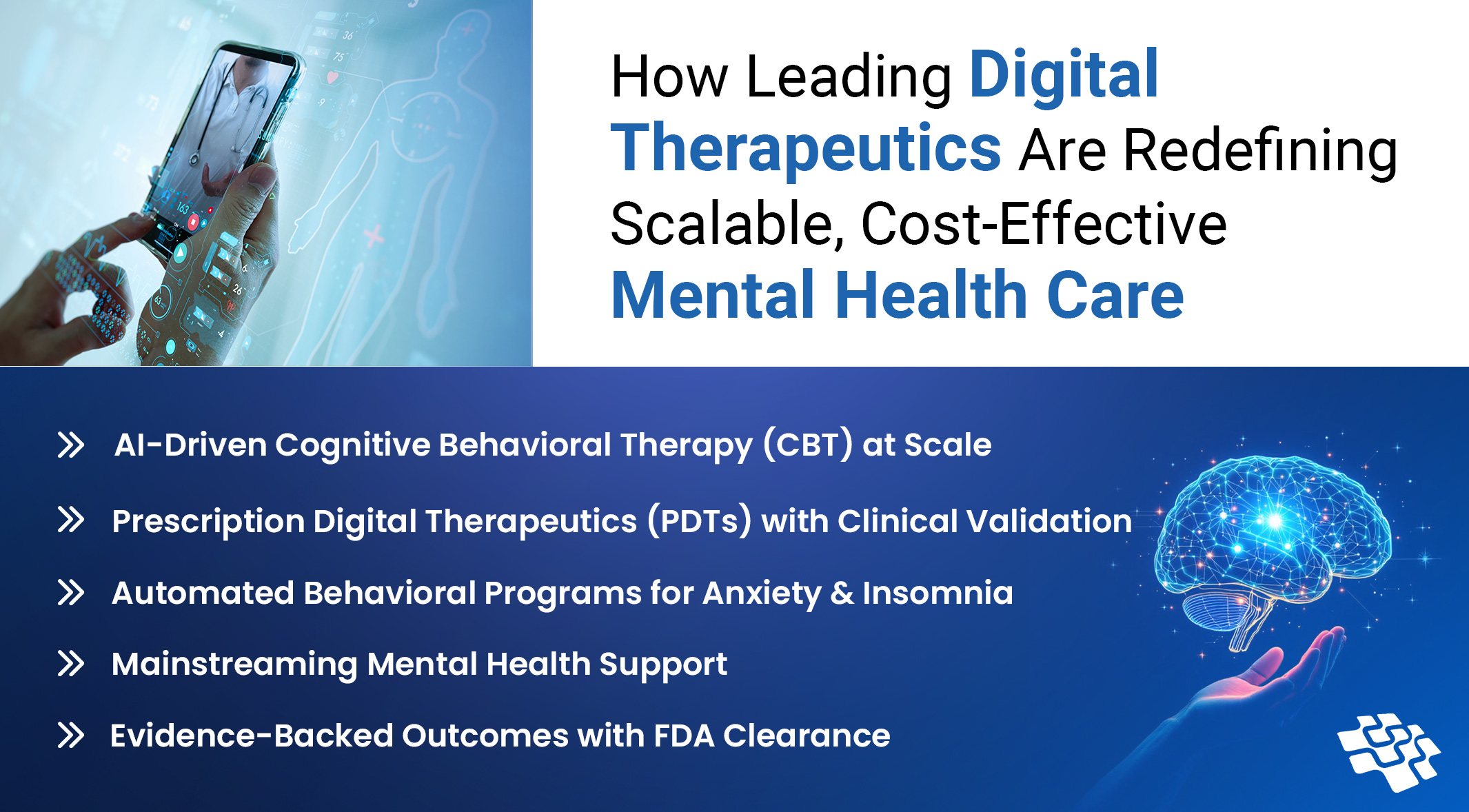 1. AI-Driven Cognitive Behavioral Therapy (CBT) at Scale
1. AI-Driven Cognitive Behavioral Therapy (CBT) at Scale